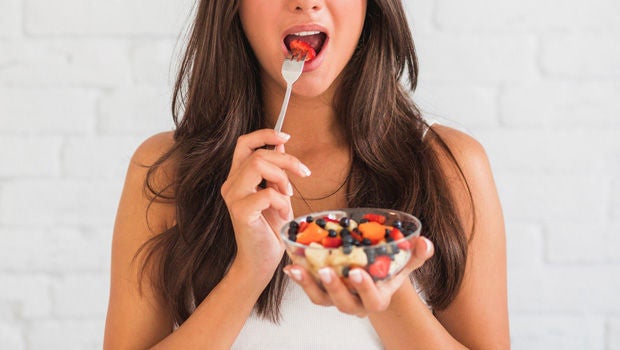
As clichéd as it sounds, we are what we eat. A healthy, balanced diet with optimal intake from the 'My Healthy Plate' components – whole-grains, meat and others, fruit and vegetables is the key to our health. Nutrition also plays an important role in promoting and maintaining skin health.
So, can we eat our way to good skin? The answer is yes. Here are five things you should eat if you want glowing, youthful skin.
Whole-grains
Wholegrain foods such as brown rice, wholemeal bread and oats provide carbohydrate - the main source of energy for the body. Whole-grains are also packed with nutrients like B vitamins which help in maintaining skin health. For example, vitamin B3 (niacin) helps to reduce water loss from our outer skin layer which is important to prevent wrinkle formation. Similarly, vitamin B6 (pyridoxine) supports collagen production and its deficiency results in flaky skin. In addition, B vitamins are vital in supporting energy production and optimal body function.
Fruit and Vegetables
Antioxidants like carotenoids, and vitamin C and E defend our skin from premature aging caused by ultraviolet radiation. Fruit and vegetables are great sources of vitamin C while carotenoids can be found in red, yellow, orange and dark green leafy vegetables. Adequate intake of vitamin C not only optimises collagen formation, it also helps in boosting immunity and increasing non-heme iron absorption. On the other hand, carotenoids are important for good vision.
Meat and Others
Loss of collagen and elasticity contributes to wrinkle formation. Our bodies require protein in order to produce collagen. Lean meat, poultry, eggs, dairy products, nuts and beans are rich sources of protein. Some of these are also rich in zinc and iron, which helps in skin repair and supports in collagen production as well as optimises the functions of carotenoids, respectively. Insufficient intake of iron can lead to iron deficiency anaemia which causes skin to look pale. In addition, fish and meats are also packed with selenium which works as an antioxidant and supports the functions of vitamin E and C.
Fats
Fat is the main component of skin and is required as part of our diet to maintain good levels of skin collagen and, therefore, elasticity. In particular, omega 3 fatty acids have an anti-inflammatory effect which prevents the skin from aging due to ultraviolet radiation-induced inflammation. Foods that are rich in omega 3 fatty acids include salmon, mackerel, sardines, tuna and walnuts. In addition, oils such as sunflower oil, safflower oil and almonds, hazelnuts and sunflower seeds are rich sources of vitamin E. Vitamin E helps our skin fight against free radicals produced in the body as well as those from the environment.
Water
We've all heard the age-old tale of how drinking more water will result in clear, beautiful skin. Turns out, it's not a myth but a fact as sufficient water intake will result in soft, supple skin. Aside from water, other beverages as well as juicy fruit and vegetables, such as watermelon, tomatoes, cucumber and lettuce, can also contribute to daily fluid intake. However, water remains the best source of hydration with zero calories! The recommended amount of fluid in a day for a healthy adult is generally between 2 to 3 litres a day.
What else can affect my skin?
In addition to nutrition and adequate hydration, the condition of our skin is also affected by many other factors including alcohol intake, sleep, stress levels, smoking, exposure to ultraviolet radiation and genetics. For most of us, a well-balanced lifestyle should lead to good, clear skin.
Have a story idea you'd like to read about? Write to us at joyatwork@singhealth.com.sg!













 Get it on Google Play
Get it on Google Play